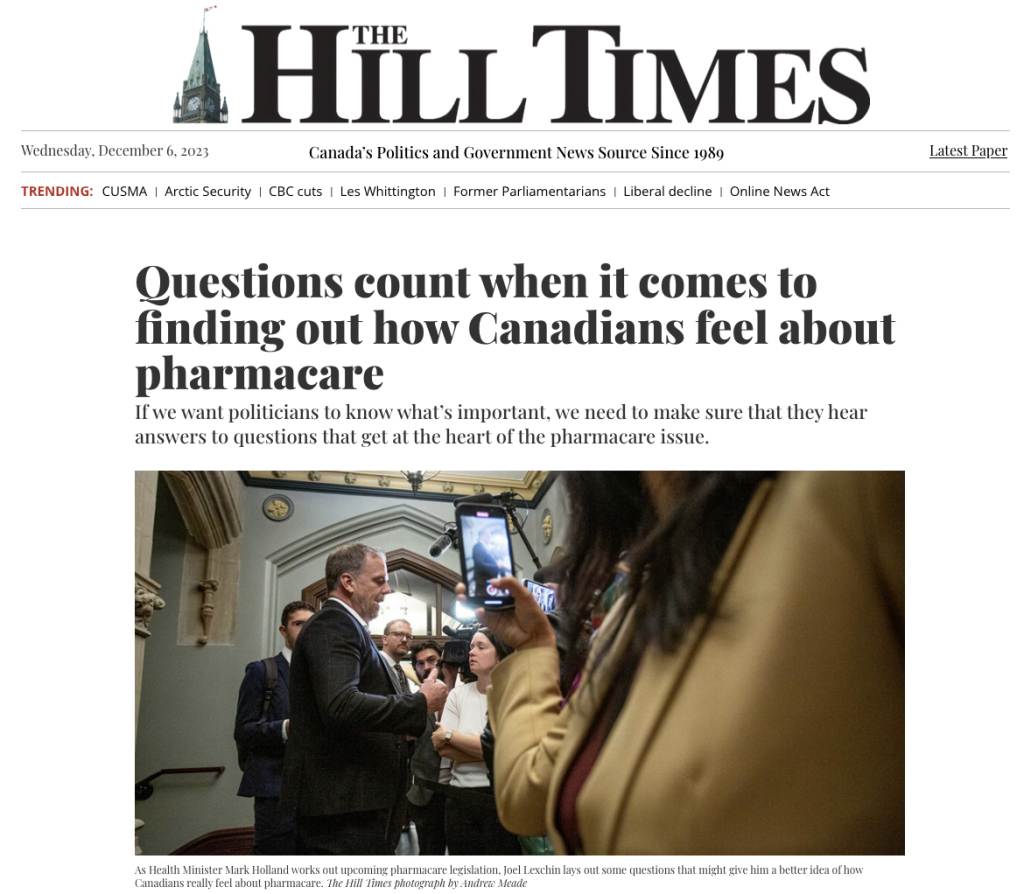Polls must ask the right questions about pharmacare
Health Coalition board member Joel Lexchin had this important article published in the influential Hill Times on Nov 29, 2023.
Questions count when it comes to finding out how Canadians feel about pharmacare
If we really want to find out how important pharmacare is to Canadians and what kind of a program they want, then we need to ask the right questions.
A Pollara survey released at the end of September makes it seem that people want a fill-in-the-gaps approach.
According to the survey, 71 per cent said that they were very or mostly satisfied with their current level of coverage. The plurality (45 per cent) preferred a new national prescription drug coverage program for Canadians who are not currently covered through some other program, versus 27 per cent who wanted a new national program that would cover all Canadians and replace all existing government and private insurance plans.
But perhaps the responses Pollara received don’t tell the whole story. For example, Pollara asked people if they were “satisfied or dissatisfied with the … plan you currently have.” But what aspect of their plan were people satisfied with: the level of deductibles and copays, the range of drugs being covered, or the amount of paperwork involved?
Forty-five per cent opted for a “fill-in-the-gaps” model, but the question didn’t explain what kind of coverage or what the out-of-pocket payment would be for the people who were in the “gaps.”
Here is another set of questions, and the background as to why they are important that might give us a better idea of how Canadians really feel about pharmacare.
1. Do you favour a government drug plan with either no or minimal copays and deductibles, or one with co-pays and deductibles that are set by the private sector?
Research has shown that even minimal co-pays can deter people from seeking health care. Back in the mid-1960s, the Liberal government in Saskatchewan put in place a copay of $1.50 for office visits. The result was a 14 per cent decrease in the use of general practitioner services by the poor. Sixty-five per cent of Canadians have private plans that determine their copays and deductibles, and fewer than 40 per cent of private plans cover the full cost of prescription drugs, leaving people in the other 60 per cent to pay variable amounts out of pocket.
2. How important is it to you that a pharmacare plan reduces the overall amount spent on prescription drugs in Canada, even if it means that governments pay more than they currently do?
In October, the Parliamentary Budget Office released a report that said that by 2027-28, a universal national plan would cost the federal and provincial governments an additional $13.4-billion on top of what they already pay for drug coverage. But at the same time, it would trim $2.2-billion off Canada’s total drug bill.
3. Are you in favour of a drug plan that would have the potential to improve the way that doctors prescribe and the way that patients use prescription drugs, even if it means that government spending on prescription drugs goes up?
The more governments are spending on providing drug coverage, the more incentivized they are going to be to ensure that the money is well spent. Across Europe, where there is universal drug coverage, there are multiple initiatives to enhance prescribing efficiency in ambulatory care.
4. Are you in favour of a pharmacare plan that covers all drugs that are approved for marketing in Canada, or one that only covers drugs that are chosen by experts and patients on the basis of unbiased evidence?
Only about 38-39 per cent of new drugs provide a moderate to major therapeutic advance over existing drugs, meaning that well over half of new drugs offer, at best, only a minor improvement. Eighty-five per cent of private plans cover all prescription drugs, including the 60 per cent that don’t do much to improve health.
5. Are you in favour of different drug plans for different groups of people based on their age, employment, or where they live, or a plan where everyone is covered equally, i.e., pays the same amount and has access to the same drugs?
A 66-year-old woman taking three psychiatric drugs and with an annual income just above $55,000 pays $350 every three months for her prescriptions if she lives in Manitoba, but if she lives in Ontario, it’s less than $20.
If we want politicians to know what’s important to us when it comes to pharmacare, we need to make sure that they hear answers to questions that get at the heart of the issue.
Joel Lexchin received his MD from the University of Toronto in 1977. He is a professor emeritus in the School of Health Policy and Management at York University, and is a member of the board of Canadian Doctors for Medicare. He is a fellow of the Canadian Academy of Health Sciences and is among the top two per cent of the world’s most highly cited researchers.




